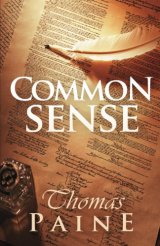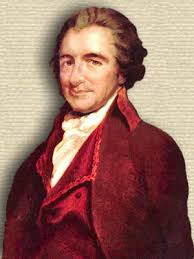Common Sense Page #2
Common Sense is a pamphlet written by Thomas Paine in 1775–1776 advocating independence from Great Britain to people in the Thirteen Colonies. Writing in clear and persuasive prose, Paine marshaled moral and political arguments to encourage common people in the Colonies to fight for egalitarian government.
Here then is the origin and rise of government; namely, a mode rendered necessary by the inability of moral virtue to govern the world; here too is the design and end of government, viz. freedom and security. And however our eyes may be dazzled with show, or our ears deceived by sound; however prejudice may warp our wills, or interest darken our understanding, the simple voice of nature and of reason will say, it is right. I draw my idea of the form of government from a principle in nature, which no art can overturn, viz. that the more simple any thing is, the less liable it is to be disordered; and the easier repaired when disordered; and with this maxim in view, I offer a few remarks on the so much boasted constitution of England. That it was noble for the dark and slavish times in which it was erected, is granted. When the world was over run with tyranny the least remove therefrom was a glorious rescue. But that it is imperfect, subject to convulsions, and incapable of producing what it seems to promise, is easily demonstrated. Absolute governments (tho' the disgrace of human nature) have this advantage with them, that they are simple; if the people suffer, they know the head from which their suffering springs, know likewise the remedy, and are not bewildered by a variety of causes and cures. But the constitution of England is so exceedingly complex, that the nation may suffer for years together without being able to discover in which part the fault lies, some will say in one and some in another, and every political physician will advise a different medicine. I know it is difficult to get over local or long standing prejudices, yet if we will suffer ourselves to examine the component parts of the English constitution, we shall find them to be the base remains of two ancient tyrannies, compounded with some new republican materials. First.--The remains of monarchical tyranny in the person of the king. Secondly.--The remains of aristocratical tyranny in the persons of the peers. Thirdly.--The new republican materials, in the persons of the commons, on whose virtue depends the freedom of England. The two first, by being hereditary, are independent of the people; wherefore in a constitutional sense they contribute nothing towards the freedom of the state. To say that the constitution of England is a union of three powers reciprocally checking each other, is farcical, either the words have no meaning, or they are flat contradictions. To say that the commons is a check upon the king, presupposes two things: First.--That the king is not to be trusted without being looked after, or in other words, that a thirst for absolute power is the natural disease of monarchy. Secondly.--That the commons, by being appointed for that purpose, are either wiser or more worthy of confidence than the crown. But as the same constitution which gives the commons a power to check the king by withholding the supplies, gives afterwards the king a power to check the commons, by empowering him to reject their other bills; it again supposes that the king is wiser than those whom it has already supposed to be wiser than him. A mere absurdity! There is something exceedingly ridiculous in the composition of monarchy; it first excludes a man from the means of information, yet empowers him to act in cases where the highest judgment is required. The state of a king shuts him from the world, yet the business of a king requires him to know it thoroughly; wherefore the different parts, by unnaturally opposing and destroying each other, prove the whole character to be absurd and useless. Some writers have explained the English constitution thus; the king, say they, is one, the people another; the peers are an house in behalf of the king; the commons in behalf of the people; but this hath all the distinctions of a house divided against itself; and though the expressions be pleasantly arranged, yet when examined they appear idle and ambiguous; and it will always happen, that the nicest construction that words are capable of, when applied to the description of some thing which either cannot exist, or is too incomprehensible to be within the compass of description, will be words of sound only, and though they may amuse the ear, they cannot inform the mind, for this explanation includes a previous question, viz. How came the king by a power which the people are afraid to trust, and always obliged to check? Such a power could not be the gift of a wise people, neither can any power, which needs checking, be from God; yet the provision, which the constitution makes, supposes such a power to exist. But the provision is unequal to the task; the means either cannot or will not accomplish the end, and the whole affair is a felo de se; for as the greater weight will always carry up the less, and as all the wheels of a machine are put in motion by one, it only remains to know which power in the constitution has the most weight, for that will govern; and though the others, or a part of them, may clog, or, as the phrase is, check the rapidity of its motion, yet so long as they cannot stop it, their endeavors will be ineffectual; the first moving power will at last have its way, and what it wants in speed is supplied by time. That the crown is this overbearing part in the English constitution needs not be mentioned, and that it derives its whole consequence merely from being the giver of places and pensions is self-evident, wherefore, though we have been wise enough to shut and lock a door against absolute monarchy, we at the same time have been foolish enough to put the crown in possession of the key. The prejudice of Englishmen, in favour of their own government by king, lords and commons, arises as much or more from national pride than reason. Individuals are undoubtedly safer in England than in some other countries, but the will of the king is as much the law of the land in Britain as in France, with this difference, that instead of proceeding directly from his mouth, it is handed to the people under the more formidable shape of an act of parliament. For the fate of Charles the first, hath only made kings more subtle--not more just.
Translation
Translate and read this book in other languages:
Select another language:
- - Select -
- 简体中文 (Chinese - Simplified)
- 繁體中文 (Chinese - Traditional)
- Español (Spanish)
- Esperanto (Esperanto)
- 日本語 (Japanese)
- Português (Portuguese)
- Deutsch (German)
- العربية (Arabic)
- Français (French)
- Русский (Russian)
- ಕನ್ನಡ (Kannada)
- 한국어 (Korean)
- עברית (Hebrew)
- Gaeilge (Irish)
- Українська (Ukrainian)
- اردو (Urdu)
- Magyar (Hungarian)
- मानक हिन्दी (Hindi)
- Indonesia (Indonesian)
- Italiano (Italian)
- தமிழ் (Tamil)
- Türkçe (Turkish)
- తెలుగు (Telugu)
- ภาษาไทย (Thai)
- Tiếng Việt (Vietnamese)
- Čeština (Czech)
- Polski (Polish)
- Bahasa Indonesia (Indonesian)
- Românește (Romanian)
- Nederlands (Dutch)
- Ελληνικά (Greek)
- Latinum (Latin)
- Svenska (Swedish)
- Dansk (Danish)
- Suomi (Finnish)
- فارسی (Persian)
- ייִדיש (Yiddish)
- հայերեն (Armenian)
- Norsk (Norwegian)
- English (English)
Citation
Use the citation below to add this book to your bibliography:
Style:MLAChicagoAPA
"Common Sense Books." Literature.com. STANDS4 LLC, 2025. Web. 21 Jan. 2025. <https://www.literature.com/book/common_sense_270>.




Discuss this Common Sense book with the community:
Report Comment
We're doing our best to make sure our content is useful, accurate and safe.
If by any chance you spot an inappropriate comment while navigating through our website please use this form to let us know, and we'll take care of it shortly.
Attachment
You need to be logged in to favorite.
Log In